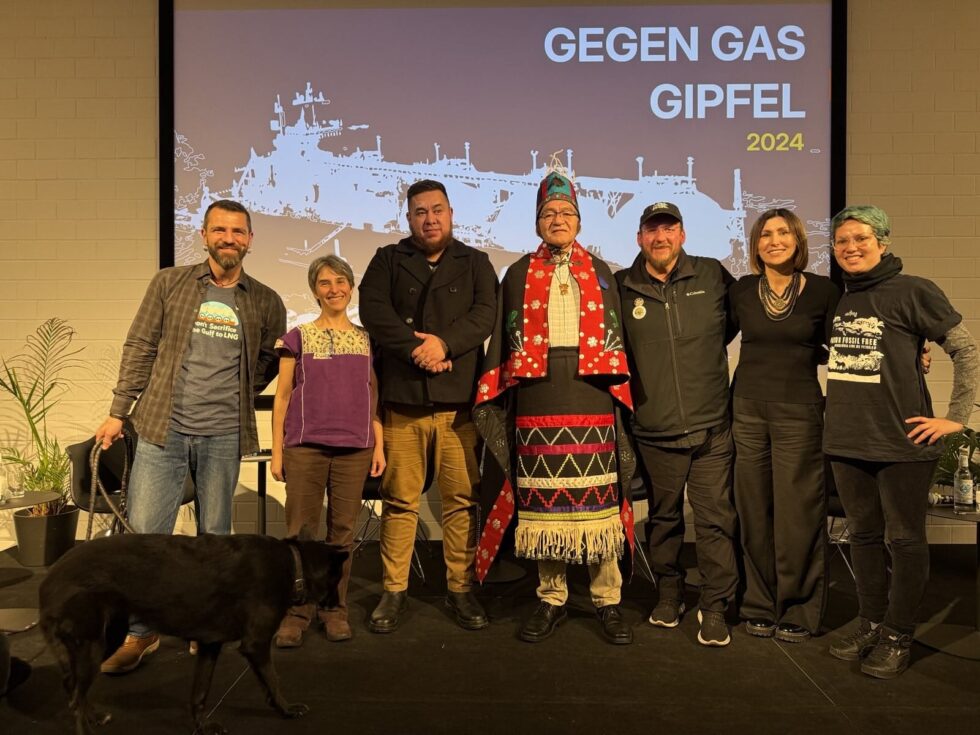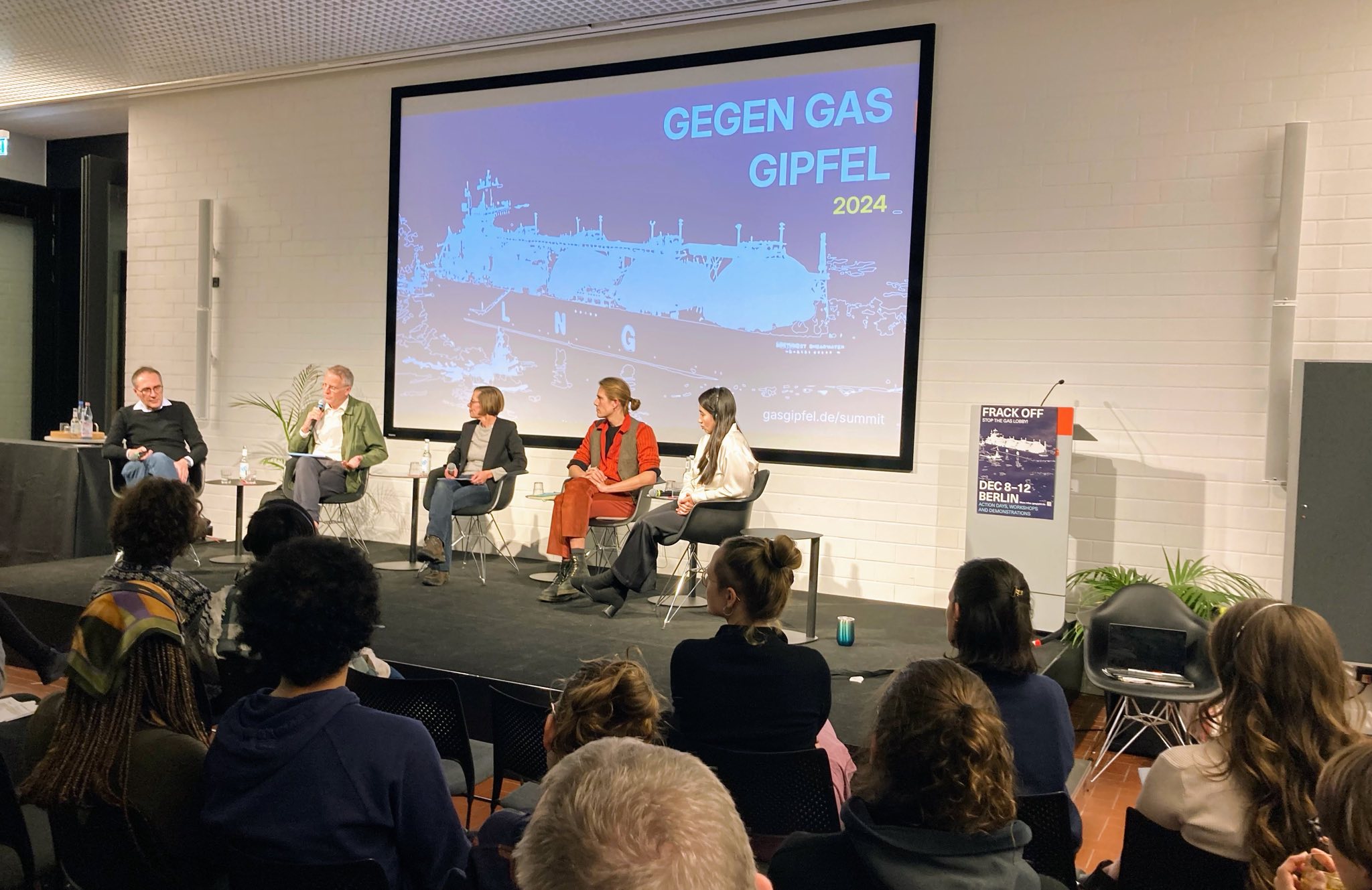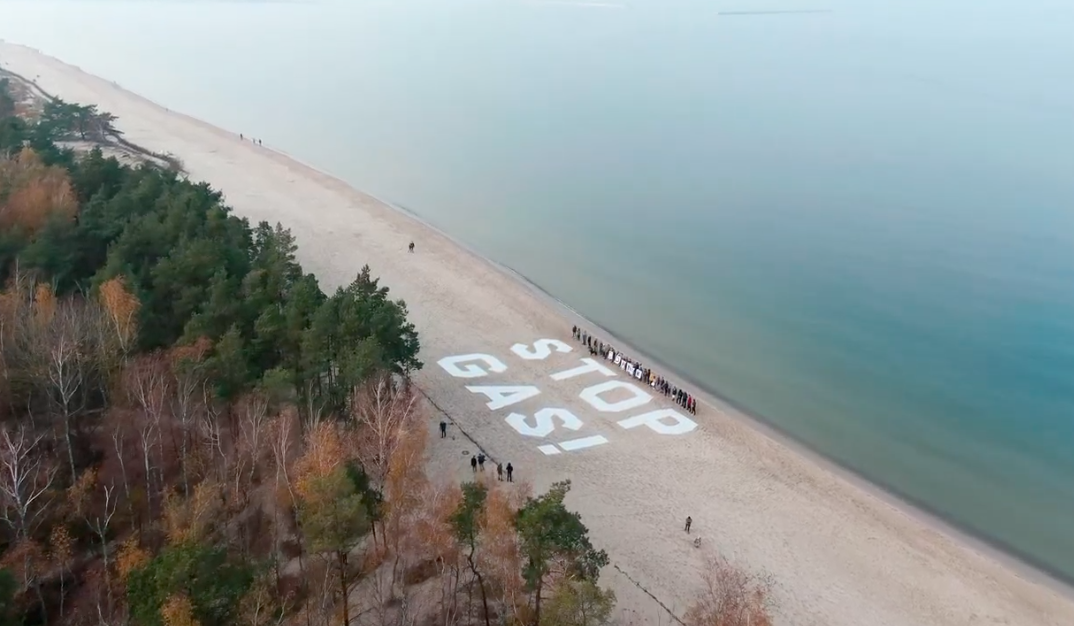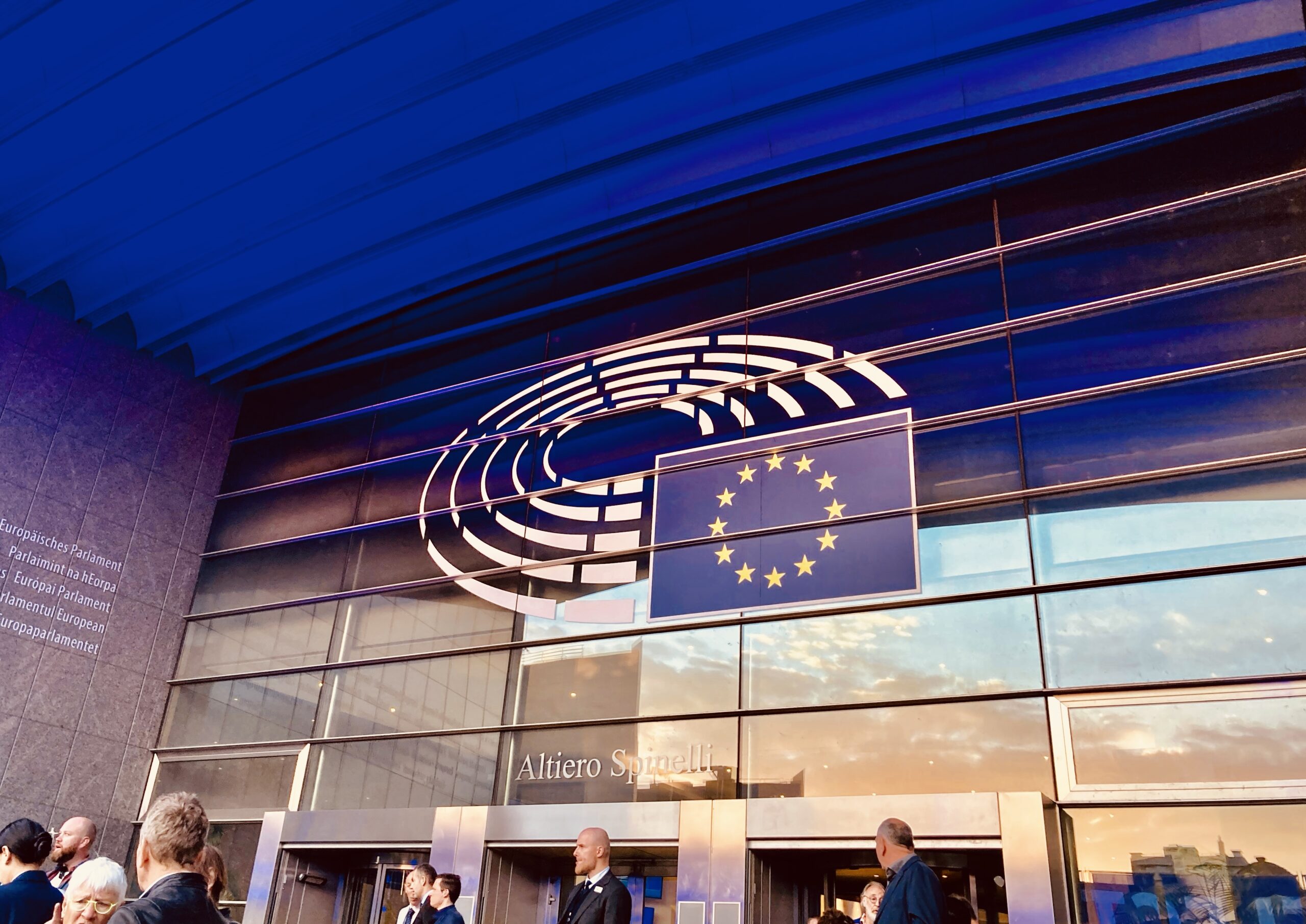Mid-December this year saw a moment of powerful strengthening for the German movement against polluting fossil gas and liquified ‘natural’ gas (LNG): Around seven hundred of activists, climate protectors and campaigners met in Berlin to collaborate, strategize or support each other’s struggles.
They were not the only ones gathering. Just next to Berlin’s famous ‘Brandenburger Tor,’ in a fancy luxury hotel, the world’s biggest polluters, government representatives and lobbyists met at the World LNG Summit to discuss how to prolong the future of one of the dirtiest fossil fuels.
The Panels
Civil society united at a vibrant Counter Summit just as polluters schmoozed and conspired on how to forge further dirty deals: how to greenwash emissions-heavy fossil gas, and how to get away with disregarding blatant human rights violations linked to LNG.
 One of the Counter Summit’s highlights was two international panels with some extraordinary panelists. They included:
One of the Counter Summit’s highlights was two international panels with some extraordinary panelists. They included:
- James Hiatt from ‘For a Better Bayou’ at the Texas-Louisiana border, a region heavily affected and polluted by fossil gas and petrochemical industries which supply Europe with gas and petrochemical products
- Mika Schachenmayr, from Fridays For Future Berlin, who reminded the audience that numerous concrete steps to finally start the ambitious gas phase-out are here and ready today
- Mima Holt, from the U.S.-based Natural Resources Defense Council, who highlighted that the American climate movement is ready to fight damaging LNG export plans despite a looming second Trump presidency
- Hereditary Chief Na’Moks from the Wet’suwet’en nation and Jesse Stoeppler, deputy chief of the Hagwilget First Nation and co–executive director of the Skeena Watershed Conservation, who warned about the extreme military brutality Indigenous tribes in what they call ‘so-called Canada’ are facing when protecting their land from fossil gas pipelines
- Svitlana Romanko, from the Ukrainian organization Razom We Stand, who illustrated how continued Russian LNG imports into Europe fill Putin’s war coffers
- Sara Ribeiro, from the Brazilian NGO Arayara, who told the crowd about the threats and destruction the Amazon rainforest and our climate faces due to oil and gas plans in the region
- Claudia Campero, from Conexiones Climaticas, who described how LNG projects threaten whales and the ‘Aquarium of the World’ in the Gulf of California
- and Sascha Müller-Kränner, managing director at German Environmental Action (DUH), one of the biggest German NGO fighting LNG build-out, who denounced Germany’s ‘LNG Acceleration Law’ which helps disregarding a proper Environmental Impact Assessment and permitting procedures, and leads to an unchecked, dangerous creation of LNG overcapacity in Germany.
Also German State Secretary Stefan Wenzel was part of the panel and responded to quite a bit of criticism from the audience. Despite being part of the Green party in Germany, which is currently in the German government coalition, Wenzel has largely promoted the country’s reckless LNG infrastructure expansion.
 While hot discussions in heated rooms took place, activists braved temperatures around the freezing point in different parts of Berlin, protesting peacefully with their presence and bodies against the fossil fuel industry summit which gambles with our future for the sole purpose of amassing corporate power and profit.
While hot discussions in heated rooms took place, activists braved temperatures around the freezing point in different parts of Berlin, protesting peacefully with their presence and bodies against the fossil fuel industry summit which gambles with our future for the sole purpose of amassing corporate power and profit.
Actions and Marches
They gathered for sit-ins and covered the summit venue with green paint to show the unacceptable greenwashing of dirty fossil LNG that took place there. They organized banner-drops and projections with anti-gas slogans on the hotel facade. On 10 December, hundreds gathered close to the luxury Adlon Hotel to march against the Summit, together forming a yellow ‘X’ (a symbol of anti-nuclear, coal and fossil resistance in Germany) and booing the fossil fuel corporations TotalEnergies and Venture Global, who received an “anti-award” for being the worst participants of the summit (although the choice was a hard one).
You Can’t Steal Our Future!
The message was clear: Civil society has solutions for the climate crisis that are not only feasible, but a clear alternative to the industry’s false fossil solutions. It was also made clear that the people don’t accept dirty deal-making behind closed doors, deals that accelerate human rights violations and climate collapse. Heavily protected by police, passing thorough security checks and certainly following media reporting on the many civil disobedience actions all around them, the gas industry executives certainly heard what protesters were telling them: You and the fossil fuels you sell belong to the past. You are not welcome here. We’re here, we’re loud, and you can’t steal our future!




 On the last weekend of October in Poland’s northern port city of Gdańsk, the 2024 Beyond Gas Conference brought together a vibrant network of activists, environmentalists, and campaigners. Representatives from across Europe and far beyond joined creative and analytical forces to discuss strategies for combating fossil gas expansion, and enabling a transition towards genuine sustainable energy solutions. The event, held over four days, featured skill-sharing sessions, storytelling exercises, open spaces, and a photo stunt. By emphasizing collaboration, and solidarity, the conference aimed to challenge systemic reliance on fossil fuels and advocate for truly just and equitable alternatives.
On the last weekend of October in Poland’s northern port city of Gdańsk, the 2024 Beyond Gas Conference brought together a vibrant network of activists, environmentalists, and campaigners. Representatives from across Europe and far beyond joined creative and analytical forces to discuss strategies for combating fossil gas expansion, and enabling a transition towards genuine sustainable energy solutions. The event, held over four days, featured skill-sharing sessions, storytelling exercises, open spaces, and a photo stunt. By emphasizing collaboration, and solidarity, the conference aimed to challenge systemic reliance on fossil fuels and advocate for truly just and equitable alternatives.
 As the sun sets on the European Parliament in Brussels on 9 June, it is the same old stone and glass building as before, but the composition of its parliamentarians has changed. While the worst results could be avoided, there is not much to celebrate.
As the sun sets on the European Parliament in Brussels on 9 June, it is the same old stone and glass building as before, but the composition of its parliamentarians has changed. While the worst results could be avoided, there is not much to celebrate.